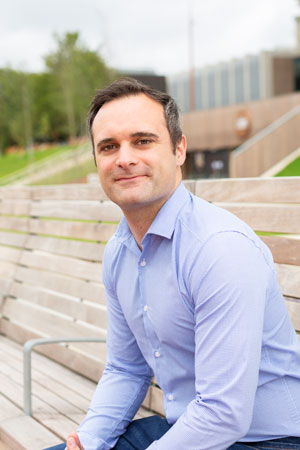PhD in English Language and Applied Linguistics student Matthew Collins says that the postgraduate community at Birmingham is large, vibrant, and friendly. We find out more about his experience as a researcher at the University of Birmingham.

Why did you choose to study a PhD in English Language and Applied Linguistics?
After working in the fundraising sector for over a decade I decided to return to academia to study a field I in which I’ve always been interested: literature. I first undertook an MA in Literary Linguistics, which allowed me to develop the skills I’d acquired as an English Literature undergraduate within a new discipline.
Why did you choose to undertake research at the University of Birmingham?
The English Language and Linguistics Department at the University of Birmingham has a world-leading reputation. The staff within the department cover a wide range of disciplines and have created a great environment for all kinds of research.
What are the best things about your course?
Birmingham offers a number of benefits to postgraduate researchers. Key among these is the dedicated postgraduate study space at Westmere House, which provided me with not only a desk throughout the three years of my course but also a space in which to meet, work, and socialise with fellow PhD students. During my research, I have taken up the opportunity to become a participating member of the department through the delivery of teaching and participating in research projects with leading academics.
What is life like as a researcher at the University of Birmingham?
The postgraduate community at Birmingham is large, vibrant, and friendly. There are many of societies and clubs across campus that cater for both academic and social needs. For those of us within the College of Arts and Law, Westmere House has been the centre of much of this social and academic activity. The facilities that the University has to offer is extensive: from large historical collections to a state-of-the-art library and numerous computer hubs. I’ve also been struck by how keen academic staff are to encourage students as the researchers of the future, and as such offer unique opportunities to join them as part of their own research teams.
What support have you received during your PhD?
I was lucky enough to receive funding through AHRC that included a stipend and covered tuition and extended to covering the costs associated with undertaking a PhD, such as research trips and conference attendance. The department also made funding available for the organisation of a weekly seminar series, reading group, and conference for postgraduates from across the world. Academically, the University supported my study through two supervisors specialised in my research area, which was supplemented with additional advice from other members of staff from across the University. In addition to this, the University Graduate School has delivered several events that have helped with navigating PhD life and have fostered a collegiate postgraduate community.
Outside of your research, what experience have you gained and how will it help you in the future?
At Birmingham, PhD researchers are encouraged to develop skills beyond academic research and for me this has been achieved through experience in teaching, event coordination, marketing, website design, public speaking, and developing successful funding applications. All of these have prepared me better for a job in higher education by further developing my understanding of the sector and the ways in which to better communicate the broader impact of academic research.